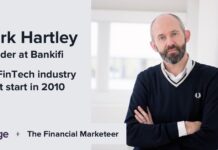Podcast interview with Tim Andrews, Founder at The ID Register
Startup to spin-out
Ask any founder; launching a startup is hard work. So if launching a normal startup is hard work, what’s it like to try and launch a startup within an existing company?
That’s exactly the challenge Tim Andrews faced when he started work on The ID Register, a fintech company that began as a department within an existing financial services firm.
Now, five years later, The ID Register has successfully spun-out from its parent organisation as part of a management buyout.
A blank sheet of paper
“I still remember the day I was sitting with a blank sheet of paper trying to do something a bit like The ID Register,” says Tim as he explains to me how the organisation came into being.
Tim, at the time, was working for a fund administration business called Ipes (which was later acquired by Apex Fund Services).
“The catalyst for ID Register was that FATCA (Foreign Account Tax Compliance Act) came along from the US which aims to identify the assets of Americans worldwide.
“Our responsibility (as a fund administrator) was to go through all of the investors who invested in our funds and identify those who were American.”
Tasked with the job or collating all of the details of their investors, the firm issued a form to all investors. The form was issued “more in hope than expectation they would fill it in,” explains Tim, “we were really blown away that so many did.”
Solving a thoroughly annoying problem
Tim’s work, reaching out to collect information from investors led him to speaking with investors from all around the world.
“All of [the investors we spoke to] had a very similar problem of having to provide this information multiple times for each of their investments and getting thoroughly annoyed.”
It’s here that the idea of providing what Tim calls a ‘one-and-done’ online profile was a powerful idea and one which investors were likely to respond well to.
A company within a company
The ID Register was incorporated in September 2015 off the back of this idea and the firm was launched later on, in mid-2016.
“The strategy of our parent [company, Ipes] at that time was to diversify its range of services and so we had to launch a range of new companies to support these services.
“It was a great experience because you had the practice of setting up a new company, getting insurance, figuring out what your unique selling point was, making sure you had the technology available, understanding what your pricing was going to be…but you could do all of that within the guardrails of the parent organisation.”
A brand within a brand
“If we aimed to be a central, neutral, trusted hub for the industry, it was really quite important we were seen to be distinct from our parent group.”
Despite this, Tim also acknowledges that having the support and experience that comes from being a part of a larger organisation is and will remain a key part of the firm’s brand.
“It was by no means a perfect brand differentiation…we were effectively a sub-brand of our parent…but I think that fundamentally, our parent helped us get off the ground and seeded us with our bank of initial client.
Developing the ‘McDonalds of KYC (know your customer)’
“Our branding with the solid burgundy colour and the image of the square that repeats throughout our website and our material is intended to denote confidence and trust.
“A square is obviously a very regular shape…part of our selling proposition that is to deliver the same service for any client at any time and that when you deal with The ID Register, you know exactly what you’re going to get.”
It’s something that Tim describes as establishing The ID Register as the ‘McDonalds of KYC’, a clear indication of the importance the organisation attributes of repeatable processes and results.
Being truly ‘fin’ and ‘tech’
The ID Register is something Tim refers to as truly ‘fin’ and ‘tech’ in the sense that it has the necessary balance of skills.
“We’ve always had our operational people, our ‘fin’ people, if you like, completely mixed up in terms of where they sit, who they work with and what they do with our ‘tech’ people.
“There are no silos or development-bunkers in The ID Register. What that does is that it focusses the development effort on the things that make the biggest difference to the operational teams.
Reaching your audience
“There’s really three ways [we reach our audience], most importantly is word of mouth…each of the investors and fund managers talk to each other.
“The second way to growth is through alliances, we identified early on that The ID Register is effectively an industry project…actors from across the eco-system need to buy into our vision.”
Third on Tim’s list is proactive communications to investors and fund managers. “One of the things we benefit from is how interconnected our industry is and generally, you’re only a small number of steps away from a warm introduction from whoever you want to talk to.”
Content marketing
“We’ve seen that providing useful information as something that actually benefits the community we serve being a useful tool.”
Tim tells me that the firm has a YouTube channel as well as using social channels to promote the firm’s content.
“We try to provide useful commentary on some of the regulation for example behind KYC in particular and the latest data protection changes within the EU and also in the US.
“We have very much tried to provide content that is useful for other. I think by and large, our marketing is mainly friendly introductions from people who appreciate our services…that’s why it’s quite important that we are enthused about our mission because at the end of the day, people buy from people.”
Becoming the trusted hub of the investment community
It’s at this point, Tim explains to me his firm’s vision over the coming months and years ahead. He explains that he would like The ID Register to become the trusted hub of the global investment community.
“The key words in there are really ‘trust’ and ‘hub’; to be trusted, first of all, we need to be regulated.
“Some of the difficulties some social media platforms have faced is that they’ve grown without being regulated…and now that they are so big we as a society are looking at them and saying, ‘oh right, you hold all of this data, did I really want that?’
“For us at the start of that journey it’s really important to engage with the regulator.”
Aside from a desire to engage with regulators, Tim explains that the firm’s plans to expand its portfolio of services will oblige it to work with the industry regulators.
“Hub is also very important and hub means that you’ve got to have lots of different spokes, so we are going to be collaborating with a range of different partners to whose businesses we can add value.
Lessons for budding intrapreneurs
“Push it, don’t be afraid,” says Tim when I asked him what advice he’d pass onto someone with a good idea they’d like to pursue within their existing organisation.
“That’s very easy to say in hindsight, but nothing comes without taking risks and I think in my case there was always an element of risk involved for me personally.
“But if it’s a great idea, there’s a lot of people out there looking for great ideas and ambitious and driven people to carry them through.
“I think the other thing is that good ideas don’t just fall out of trees and then just happen…I think most people in our industry have thought about this idea but it’s always been too difficult to achieve. We have worked extremely hard to get to this point and there’s been a lot of effort from a lot of people…this is very much a team effort.”
Tim ends with a simple point; providing a successful service often comes back to understanding your audience and experiencing the pain you are trying to solve for them.
It’s a powerful point and one that has seen The ID Register grow into an exciting fintech firm with a lot to look forward to.











